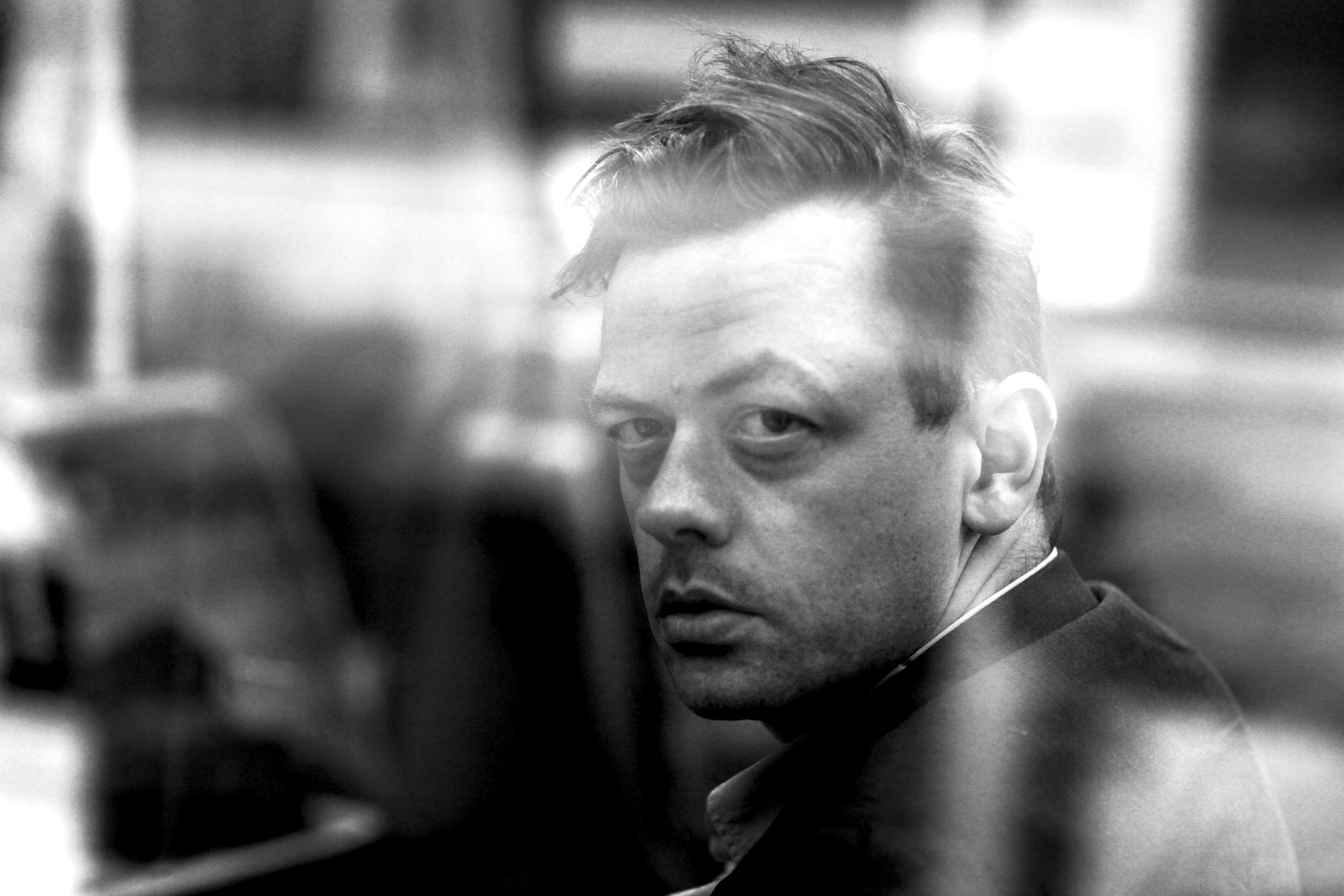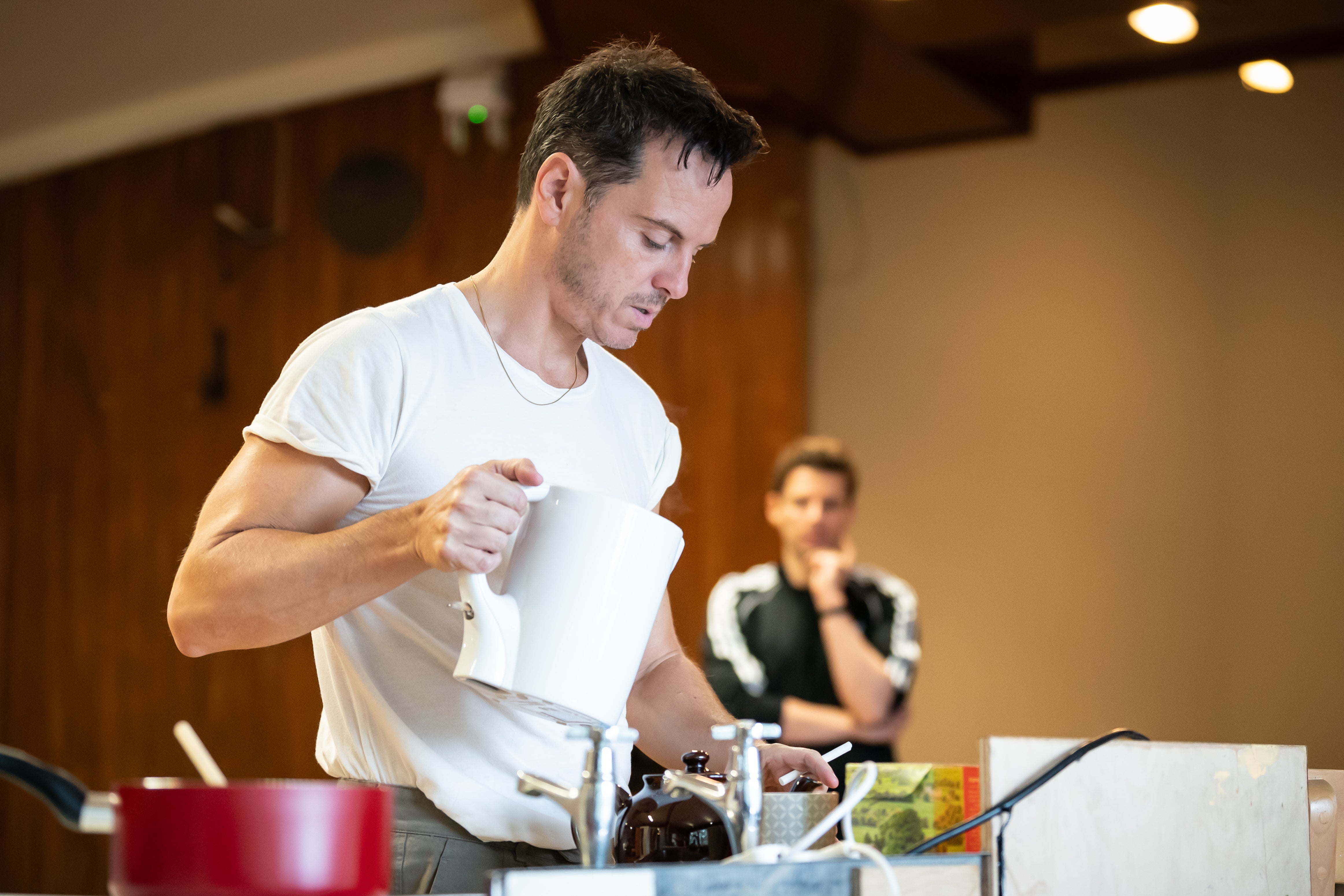Curious Incident playwright Simon Stephens: ‘I used to think my success was an administrative error’
Simon Stephens has written more plays than Shakespeare, goes on theatre dates with Gary Lineker, and ‘Fleabag’ star Andrew Scott is his muse. But even Britain’s most prolific playwright gets his work rejected, he tells Andrzej Lukowski

Simon Stephens chuckles incredulously at my first question, which is a query as to whether he knows how many plays he’s written. Because it’s a lot. “When I got past 38 I definitely felt a bit weird about it,” he says, sheepishly, “because that’s the number that Shakespeare wrote.”
After some deliberation over whether we’re counting adaptations of other playwrights’ work, or the early plays that he’s now pretty much disowned, the youthful, boomingly enthusiastic 52-year-old declares – with reasonable confidence – that the number is 45, running the gamut from the warm, naturalistic dramas, set in his native Stockport, that kicked off his career, to the bleak, cryptic plays that made him massive in Europe, and his one bona fide mega-hit: the National Theatre’s colossally successful stage version of Mark Haddon’s bestseller The Curious Incident of the Dog in the Night-Time.
Many of them have been written just a few minutes away from the waterside cafe in London’s Victoria Park in which we’re sitting. Though from Stockport, Stephens has now lived most of his life in east London, and it shows: when I arrive, he’s amiably chatting to a local young person, presumably a friend of one of his three kids, who still live with him and his wife, the actor Polly Frame.
There is no accurate measure of these things, but he is probably the most globally performed living British playwright: his works have been translated into innumerable languages. But he basically looks like a bloke in a band. Which is not unreasonable. In his twenties, he moved to Edinburgh, where he was the founder bassist of the long-defunct art-punk band Country Teasers. And he retains a real DIY musician’s distrust of blowing his own trumpet.
He insists that he doesn’t feel especially prolific; it’s just that he’s never been interested in writing for the screen like so many of his peers – he doesn’t even find TV interesting, really. “I watch Match of the Day, basically. That’s genuinely all I watch on television.” He’s one of the few playwrights of his stature who is free to just get on with the business of bashing out plays. “I’ve been pretty steady in writing a play every nine months for about 20 years,” he says. “I’m really boring!”
He can call it that, but at the height of his UK success he felt like a real prodigy – less prolific than virtually omnipresent: in 2012 he had five London premieres, including the juggernaut smash that was Curious Incident.
Pinning down Stephens’s exact style is tricky. His first successes were naturalistic, Chekhov-indebted dramas, often set around Stockport – perhaps most notably 2005’s Matt Smith-starring family epic On the Shore of the Wide World, which bagged the playwright his first Best New Play Olivier award.
But by the late ’00s and early ’10s he’d changed gear and switched to a thrillingly dark, arty mode that birthed challenging works like Pornography – an enigmatic response to the 2005 London bombings – and Three Kingdoms, a Lynchian pan-European detective story. He acquired cult hero status in left-field theatre circles, where he was widely seen as the only mainstream British playwright making work as daring as that of his continental counterparts. And then Curious Incident went supernova. One of the most successful plays of the decade, its marriage of the tenderness of his older work and the offbeat structure of his later stuff made it the perfect vehicle for Haddon’s megaseller about a neurodivergent boy’s epic quest to solve a canine-related crime.
Until I was 27 I spent most of my time thinking I was a total failure
“There was never any sense of ‘We’re gonna make our fortunes here’,” he recalls. “It was just, ‘We love this novel. Let’s try and make it with as much compassion as we can.’ It wasn’t attempting to be cinema, there was no star casting, it was a celebration of the theatrical form and 4 million people saw it. That’s f***ing brilliant, you know.”
In true Gen X style, Stephens didn’t especially enjoy being the hottest playwright in the UK. “Until I was 27 I spent most of my time thinking I was a total failure,” he says cheerily. “And then from 27 to about 37 thinking that my success was due to administrative error. From pretty much that moment onwards, I’ve had a voice in my head saying, ‘Well, that was good, but you’re past it now, you’re done.’”
His 2023 isn’t exactly going horribly: we’re here to discuss his new West End play, Vanya. A one-man version of Chekhov’s wistful masterpiece Uncle Vanya, it’s performed by the brilliant Andrew Scott. Star of Stephens’s earlier classics Sea Wall and Birdland, the Sherlock and Fleabag actor is something of a muse for Stephens.

“He’s kind of the best,” enthuses the playwright, “such a brilliant, creative, imaginative actor. There are a lot of roles that I’ve written that I couldn’t have written unless I’d imagined Andrew playing them. And he never was going to play them. But he’s just somebody who in my mind crystallises the abstraction of words into a body and a voice.”
Stephens has adapted other Chekhov plays as conventional ensemble dramas, and the plan was to do the same here. But before any other casting, Stephens and director Sam Yates arranged a read-through with Scott in which the three of them would alternate lines, except Scott would do all the title character’s parts, which meant he’d sometimes cue himself up. “And it was absolutely fascinating,” says Stephens, “like watching the mechanisms of dramatic storytelling filter through this one body. So we asked him if he could do another read where he read all of it, and it was really glorious.”
It’s been a long time since the UK actually had a new original Stephens play: the last was Light Falls in 2019, with nothing in London since 2017. It feels a little surprising that this is the case, given his formidable work rate and global popularity. That’s not to be dismissive of his adaptations. But he is, in fact, writing new plays – we just don’t see most of them. International success is part of it: his last few original works premiered in Tokyo and New York, with his next due to be performed in Stuttgart in 2024. But there’s something nagging about the fact that 2020’s excellent Fortune – a wild, vivid riff on Faust that follows a film director who sells his soul – is very palpably set in London, and yet has only been seen in Japan. Why, I ask blithely, didn’t it play over here?
He looks pained. “It is absolutely about London,” he says. “It was originally written for the National Theatre, and it was my first rejected commission for 20 years.”
Even for somebody who wears his modesty like a badge, it’s clearly something that bothers him: rejection from the NT must on some level feel like rejection from a British theatre establishment that was all over him a decade ago – not to mention the fact that it was the specific theatre that produced his biggest hit, Curious Incident.
“It’s a big bruise,” he sighs. “But in my working life, the things that I’ve learnt from haven’t been the successes. I didn’t learn anything from Curious Incident,” he laughs. “It will probably be all right in the end. I learnt that.”

We discuss a recent article by the playwright David Eldridge, who heavily criticised British theatre bosses – including NT artistic director Rufus Norris – for callously ghosting playwrights they had longstanding relationships with, in some cases ignoring plays they had commissioned. “Pretty much everything he said was really bang on,” nods Stephens.
So he’s been ghosted himself?
“Yeah, definitely,” he nods. “I think it’s important to say it, because I think if I was a 29-year-old writer who just delivered a commissioned play and then didn’t hear back from the theatre for two months, I’d think that it was personal against me.
“A lot of directors in the last five or 10 years have failed to engage with as much care and thought as they should with the work of writers they’ve commissioned.
“And I think they’re starting to be alert to that now, and I think they’ll do better.”
He ducks the question of whether he felt personally mistreated by the National Theatre regarding Fortune, but indicates that things are on the mend between him and Norris.
“I’m working with Rufus on the possibility of something,” he says. “Now, I think he’s treating me with real sensitivity and intelligence and care, and I think maybe when he first took over the job, he was a bit overwhelmed by it and maybe that care of playwrights was allowed to slide.”
One reason why it might feel like Stephens’s profile has dipped of late is that the once prolific tweeter effectively quit social media after the 2019 election, when his long-standing criticism of Jeremy Corbyn culminated in so much aggro from the erstwhile Labour leader’s supporters that “my Twitter feed just became a place of hatred, and I don’t need that in my pocket”.
Nonetheless, he’s grateful to the platform for giving him one great friendship. In August 2013, an enthusiastic tweet about the return of Match of the Day earned staunch Manchester United supporter Stephens a follow and a message from Gary Lineker. The two struck up a bona fide friendship, and are now often to be seen at the theatre together.
“The thing about me and Gary is we’re both middle-aged men,” he explains. “He’s from Leicester, I’m from Stockport. He’s been phenomenally successful. But he’s still a boy from Leicester, you know, and I think our friendship is based on recognising that our success is something that we’re really grateful for. We weren’t born into it. He had to work really f***ing hard to get there. And when that happens, you really love it.”
That’s the crux of it: Simon Stephens loves what he’s doing. Not the razzle-dazzle: he loves living in east London with his wife and kids and banging out a play every nine months. Most of them go on to success in some country or other. Some don’t. And as he says, it’s all right in the end.
“All I can do is just write the next play and make sure that it’s a play that I wish somebody else had written so that I could watch it,” he says. “There will be times when everybody wants a bit of you, and there’ll be times when everybody is profoundly uninteresting. All you can have power over is the plays that you write.”
‘Vanya’ is at the Duke of York’s Theatre until 21 October






Join our commenting forum
Join thought-provoking conversations, follow other Independent readers and see their replies
Comments